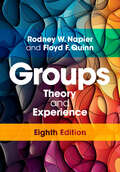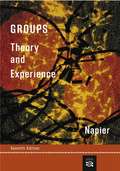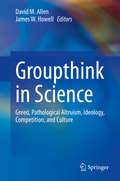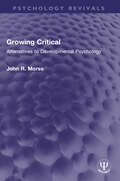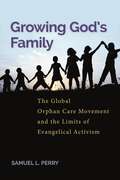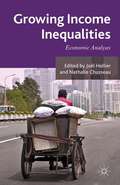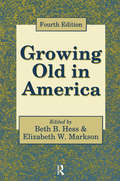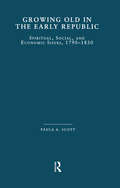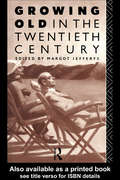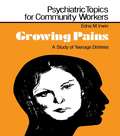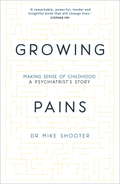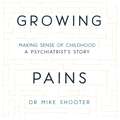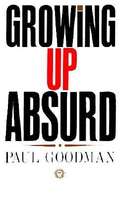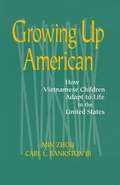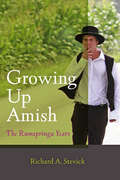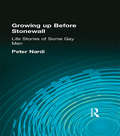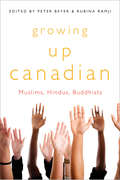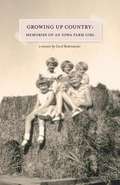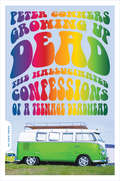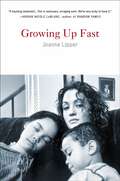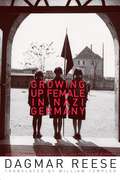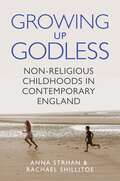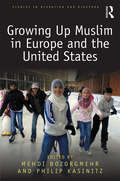- Table View
- List View
Groups: Theory and Experience
by Rodney W. Napier Floyd F. Quinn Matti GershenfeldRetaining the broad yet practical approach of previous editions, this popular textbook has been fully updated with research and theory from the last two decades to guide students through the concepts and principles of group dynamics. It now includes a brand-new introductory chapter, three new chapters on diversity and inclusion, creativity and design, and virtual groups, and dedicated chapters on communication and perception. Each chapter features in-class 'Try this!' activities that promote understanding of practical applications, new case examples from real-world organizations, and enhanced learning objectives to guide readers' learning experience. Hundreds of new studies have been added throughout, and examples consider the effects of the COVID-19 pandemic, remote working, the MeToo movement, social media, climate change, and political polarization. Suitable for both undergraduates and first-year graduates, this textbook is supported by an online test bank, PowerPoint lecture slides, activity worksheets, and suggested additional resources.
Groups: Theory and Experience
by Rodney W. Napier Matti K. GershenfeldGroups includes research on group dynamics and current views on ways to make working in groups more effective. Napier and Gershenfeld present complex concepts in a way that makes them more understandable, recognizing that students are more familiar with the dynamics of individual behavior and building on that knowledge to teach group theory. Case studies provide real-life context and exercises engage students in the learning process by asking them to apply what they learn to their own lives.
Groupthink in Science: Greed, Pathological Altruism, Ideology, Competition, and Culture
by David M. Allen James W. HowellThis book discusses one of the hottest topics in science today, i.e., the concern over certain problematic practices within the scientific enterprise. It raises questions and, more importantly, begins to supply answers about one particularly widespread phenomenon that sometimes impedes scientific progress: group processes. The book looks at many problematic manifestations of “going along with the crowd” that are adopted at the expense of truth. Closely related is the concept of pathological altruism or altruism bias—the tendency of scientists to bias their research in order to further the ideological or financial interests of an “in-group” at the expense of both the interest of other groups as well as the truth. The book challenges the widespread notion that science is invariably a benevolent, benign process. It defines the scientific enterprise, in practice as opposed to in theory, as a cultural system designed to produce factual knowledge. In effect, the book offers a broad and unique take on an important and incompletely explored subject: research and academic discourse that sacrifices scientific objectivity, and perhaps even the scientist’s own ethical standards, in order to further the goals of a particular group of researchers or reinforce their shared belief system or their own interests, whether economic, ideological, or bureaucratic.
Growing Critical: Alternatives to Developmental Psychology (Psychology Revivals)
by John R. MorssOriginally published in 1996, and now with a new preface, Growing Critical is an introduction to critical psychology, focusing on development. It takes a fresh look at infancy, childhood and adulthood and makes the startling claim that ‘development’ does not exist. John R. Morss guides the reader from the early critical movements of the 1970s which gave rise to the ‘social construction of development’ through the wide range of more recent approaches. He looks in turn at Vygotsky’s ‘social context of development’, Harré’s ‘social constructionism’, Marxist critique of developmental psychology, psychoanalytic interpretations of development, and finally post-structuralist approaches following Foucault and Derrida. He surveys the range of alternative positions in the critical psychology of development and evaluates the achievements of Newman and Holzman, Broughton, Tolman, Walkerdine and others. Marxism, psychoanalysis and post-structuralism – as well as such movements as feminism – challenge our understanding of human development. Morss looks beyond the laboratory to Marx and Freud, to Lacan and Foucault. What sets Growing Critical apart from orthodox psychology is the seriousness with which he has thought through the implications of these challenges. Contemporary and ‘reader-friendly’, Growing Critical will be of value to both undergraduate and advanced students, as well as to anyone interested in human development, in psychology, sociology or education.
Growing God’s Family: The Global Orphan Care Movement and the Limits of Evangelical Activism (Alternative Criminology)
by Samuel L. PerryIllustrates the hidden challenges embedded within the evangelical adoption movement. For over a decade, prominent leaders and organizations among American Evangelicals have spent a substantial amount of time and money in an effort to address what they believe to be the “Orphan Crisis” of the United States. Yet, despite an expansive commitment of resources, there is no reliable evidence that these efforts have been successful. Adoptions are declining across the board, and both foster parenting and foster-adoptions remain steady. Why have evangelical mobilization efforts been so ineffective? To answer this question, Samuel L. Perry draws on interviews with over 220 movement leaders and grassroots families, as well as national data on adoption and fostering, to show that the problem goes beyond orphan care. Perry argues that evangelical social engagement is fundamentally self-limiting and difficult to sustain because their subcultural commitments lock them into an approach that does not work on a practical level. Growing God’s Family ultimately reveals this peculiar irony within American evangelicalism by exposing how certain aspects of the evangelical subculture may stimulate activism to address social problems, even while these same subcultural characteristics undermine their own strategic effectiveness. It provides the most recent analysis of dominant elements within the evangelical subculture and how that subculture shapes the engagement strategies of evangelicals as a group.
Growing Income Inequalities
by Joël Hellier Nathalie ChusseauThis book provides an up-to-date survey of existing economic literature on the dimensions of growing income inequalities in both advanced and emerging countries. The different explanations and dimensions of inequalities are addressed, particularly globalization, technical progress, in-work poverty, changes in labour market institutions, education and intergenerational mobility, growth and development. The nine chapters provide simplified models exploring each of these elements, and assess commonly accepted explanations and mechanisms.
Growing Old in America: New Perspectives on Old Age
by Beth B. Hess Elizabeth W. MarksonModern industrial societies are characterized by long-term declines in fertility and steady increases in life expectancy. Together, these trends result in an aging population. The United States is no exception; since 1969 the median age has risen from 29.4 to a projected 36.4 in the year 2000. This fourth edition of the standard reader on the sociology of aging has been completely revised, with 90 percent new material, to reflect new information and new issues in this rapidly developing field. Students and practicing professionals will find it a lively, accessible overview.
Growing Old in the Early Republic: Spiritual, Social, and Economic Issues, 1790-1830 (Garland Studies on the Elderly in America)
by Paula A. ScottThe focus for this study is Connecticut and the city of Hartford. The text explores different themes and experiences of the elderly in Connecticut in the years between 1790 and 1830 The purpose of the book is to record and to illuminate the spiritual and emotional aspects of being elderly, the economic consequences of growing old, and the ways social experience changed with advancing years.
Growing Old in the Twentieth Century
by Margot JefferysGrowing Old in the Twentieth Century investigates many aspects of the current debates raging regarding care and provision for the elderly and the very elderly. It will be invaluable to gerontologists, social policy makers, official and unofficial carers, and anyone involved in health care.
Growing Pains: A Study of Teenage Distress
by Edna M. IrwinFirst Published in 1978. Routledge is an imprint of Taylor & Francis, an informa company.
Growing Pains: Making Sense of Childhood A Psychiatrists Story
by Dr Mike Shooter'A remarkable, powerful, tender and insightful book that will change lives' Stephen Fry'A unique book . . . The stories [Shooter] tells are poignant and powerful testimonies to the resilience of the human spirit' Marjorie Wallace, CBE'Through fascinating case studies, Dr Mike Shooter explores issues such as grief, bullying, family breakdown and self-harm. It's a compelling and fascinating glimpse into his career, but is also full of insights into the minds of children, the struggles of growing up and the challenges of parenting'Max Pemberton, Daily Mail'An excellent read for psychiatrists and other mental health professionals, whether they work with children or adults'MDEdge* * * * * * * * * *Child psychiatrist Dr Mike Shooter sheds light on the painful issues and universal experience of growing up, through the stories of his patients and their families.Growing up isn't easy. We can be at our most vulnerable and confused. And the right help isn't always there when we need it most. For over forty years psychiatrist Mike Shooter has listened to children and adolescents in crisis, helping them to find their stories and begin to make sense of their lives. Mike Shooter's own life has been shaped by his battle with depression. It makes him question received wisdom. He knows labels won't always fit and one diagnosis will not work for all. His patients' stories are at the heart of this book. Mike Shooter shares their journey as, through therapy, they confront everything from loss and family breakdown to bullying, grief and illness. We see how children begin to make breakthroughs with depression or anxiety, destructive, even sometimes violent behaviour.Growing Pains is compelling and compassionate - a book to make us wiser and braver, and to help us see how children's stories can find happier endings.
Growing Pains: Making Sense of Childhood – A Psychiatrist's Story
by Dr Mike Shooter'A remarkable, powerful, tender and insightful book that will change lives' Stephen Fry'A unique book . . . The stories [Shooter] tells are poignant and powerful testimonies to the resilience of the human spirit' Marjorie Wallace, CBE'Through fascinating case studies, Dr Mike Shooter explores issues such as grief, bullying, family breakdown and self-harm. It's a compelling and fascinating glimpse into his career, but is also full of insights into the minds of children, the struggles of growing up and the challenges of parenting'Max Pemberton, Daily Mail'An excellent read for psychiatrists and other mental health professionals, whether they work with children or adults'MDEdge* * * * * * * * * *Child psychiatrist Dr Mike Shooter sheds light on the painful issues and universal experience of growing up, through the stories of his patients and their families.Growing up isn't easy. We can be at our most vulnerable and confused. And the right help isn't always there when we need it most. For over forty years psychiatrist Mike Shooter has listened to children and adolescents in crisis, helping them to find their stories and begin to make sense of their lives. Mike Shooter's own life has been shaped by his battle with depression. It makes him question received wisdom. He knows labels won't always fit and one diagnosis will not work for all. His patients' stories are at the heart of this book. Mike Shooter shares their journey as, through therapy, they confront everything from loss and family breakdown to bullying, grief and illness. We see how children begin to make breakthroughs with depression or anxiety, destructive, even sometimes violent behaviour.Growing Pains is compelling and compassionate - a book to make us wiser and braver, and to help us see how children's stories can find happier endings.
Growing Pains: Making Sense of Childhood – A Psychiatrist's Story
by Dr Mike Shooter'A remarkable, powerful, tender and insightful book that will change lives. I cannot doubt that hundreds - I would hope thousands - of families can be helped by Mike Shooter's profound, careful and utterly convincing insights.' STEPHEN FRY'A unique book . . . The stories [Shooter] tells are poignant and powerful testimonies to the resilience of the human spirit and will fascinate all of us who struggle to make sense of our own and other people's lives.' MARJORIE WALLACE CBE'Brilliant book. Mike Shooter has . . . given us a truly 3D picture of the struggles of growing up.' PROFESSOR DAME SUE BAILEY, Chair of the Academy of Medical Royal Colleges* * * * * * * * * *Child psychiatrist Dr Mike Shooter sheds light on the painful issues and universal experience of growing up, through the stories of his patients and their families.Growing up isn't easy. We can be at our most vulnerable and confused. And the right help isn't always there when we need it most. For over forty years psychiatrist Mike Shooter has listened to children and adolescents in crisis, helping them to find their stories and begin to make sense of their lives. Mike Shooter's own life has been shaped by his battle with depression. It makes him question received wisdom. He knows labels won't always fit and one diagnosis will not work for all. His patients' stories are at the heart of this book. Mike Shooter shares their journey as, through therapy, they confront everything from loss and family breakdown to bullying, grief and illness. We see how children begin to make breakthroughs with depression or anxiety, destructive, even sometimes violent behaviour.Growing Pains is compelling and compassionate - a book to make us wiser and braver, and to help us see how children's stories can find happier endings.
Growing Up American: How Vietnamese Children Adapt to Life in The United States
by Min Zhou Carl L. BankstonVietnamese Americans form a unique segment of the new U. S. immigrant population. Uprooted from their homeland and often thrust into poor urban neighborhoods, these newcomers have nevertheless managed to establish strong communities in a short space of time. Most remarkably, their children often perform at high academic levels despite difficult circumstances. Growing Up American tells the story of Vietnamese children and sheds light on how they are negotiating the difficult passage into American society. Min Zhou and Carl Bankston draw on research and insights from many sources, including the U. S. census, survey data, and their own observations and in-depth interviews. Focusing on the Versailles Village enclave in New Orleans, one of many newly established Vietnamese communities in the United States, the authors examine the complex skein of family, community, and school influences that shape these children's lives. With no ties to existing ethnic communities, Vietnamese refugees had little control over where they were settled and no economic or social networks to plug into. Growing Up American describes the process of building communities that were not simply transplants but distinctive outgrowths of the environment in which the Vietnamese found themselves. Family and social organizations re-formed in new ways, blending economic necessity with cultural tradition. These reconstructed communities create a particular form of social capital that helps disadvantaged families overcome the problems associated with poverty and ghettoization. Outside these enclaves, Vietnamese children faced a daunting school experience due to language difficulties, racial inequality, deteriorating educational services, and exposure to an often adversarial youth subculture. How have the children of Vietnamese refugees managed to overcome these challenges? Growing Up American offers important evidence that community solidarity, cultural values, and a refugee sensibility have provided them with the resources needed to get ahead in American society. Zhou and Bankston also document the price exacted by the process of adaptation, as the struggle to define a personal identity and to decide what it means to be American sometimes leads children into conflict with their tight-knit communities. Growing Up American is the first comprehensive study of the unique experiences of Vietnamese immigrant children. It sets the agenda for future research on second generation immigrants and their entry into American society.
Growing Up Amish: The Rumspringa Years (Young Center Books in Anabaptist and Pietist Studies)
by Richard A. StevickAccurately reveals the challenges faced by Amish youth caught between the expectations of traditional community and the pressures and temptations of adolescence.On the surface, it appears that little has changed for Amish youth in the past decade: children learn to work hard early in life, they complete school by age fourteen or fifteen, and a year or two later they begin Rumspringa—that brief period during which they are free to date and explore the outside world before choosing whether to embrace a lifetime of Amish faith and culture.But the Internet and social media may be having a profound influence on significant numbers of the Youngie, according to Richard A. Stevick, who says that Amish teenagers are now exposed to a world that did not exist for them only a few years ago. Once hidden in physical mailboxes, announcements of weekend parties are now posted on Facebook. Today, thousands of Youngie in large Amish settlements are dedicated smartphone and Internet users, forcing them to navigate carefully between technology and religion. Updated photographs throughout this edition of Growing Up Amish include a screenshot from an Amish teenager's Facebook page.In the second edition of Growing Up Amish, Stevick draws on decades of experience working with and studying Amish adolescents across the United States to produce this well-rounded, definitive, and realistic view of contemporary Amish youth. Besides discussing the impact of smartphones and social media usage, he carefully examines work and leisure, rites of passage, the rise of supervised youth groups, courtship rituals, weddings, and the remarkable Amish retention rate. Finally, Stevick contemplates the potential of electronic media to significantly alter traditional Amish practices, culture, and staying power.
Growing Up Before Stonewall: Life Stories Of Some Gay Men
by Peter NardiThis book tells the stories of 11 American gay men who tried to make sense of their identities in the years before the modern gay movement began. In their own words, these men recollect fascinating accounts of what it was like negotiate their desires within a social and psychological context in which homosexuality was marginalized. The editors carefully situate the lifestories in US culture before Stonewall and skillfully raises the issues and problems in presenting such stories.
Growing Up Canadian
by Peter Beyer Rubina RamjiA significant number of Canadian-raised children from post-1970s immigrant families have reached adulthood over the past decade. As a result, the demographics of religious affiliation are changing across Canada. Growing Up Canadian is the first comparative study of religion among young adults of Muslim, Hindu, and Buddhist immigrant families. Contributors consider how relating to religion varies significantly depending on which faith is in question, how men and women have different views on the role of religion in their lives, and how the possibilities of being religiously different are greater in larger urban centres than in surrounding rural communities. Interviews with over two hundred individuals, aged 18 to 26, reveal that few are drawn to militant, politicized religious extremes, how almost all second generation young adults take personal responsibility for their religion, and want to understand the reasons for their beliefs and practices. The first major study of religion among this generation in Canada, Growing Up Canadian is an important contribution to understanding religious diversity and multiculturalism in the twenty-first century. Contributors include Peter Beyer, Kathryn Carrière, Wendy Martin, and Lori Beaman (University of Ottawa), Rubina Ramji (Cape Breton University), Nancy Nason-Clark and Cathy Holtmann (University of New Brunswick), Shandip Saha (Athabasca University), John H. Simpson (University of Toronto), and Marie-Paule Martel-Reny (Concordia University)
Growing Up Canadian: Muslims, Hindus, Buddhists (McGill-Queen's Studies in Ethnic History #110)
by Peter Beyer Rubina RamjiA significant number of Canadian-raised children from post-1970s immigrant families have reached adulthood over the past decade. As a result, the demographics of religious affiliation are changing across Canada. Growing Up Canadian is the first comparative study of religion among young adults of Muslim, Hindu, and Buddhist immigrant families. Contributors consider how relating to religion varies significantly depending on which faith is in question, how men and women have different views on the role of religion in their lives, and how the possibilities of being religiously different are greater in larger urban centres than in surrounding rural communities. Interviews with over two hundred individuals, aged 18 to 26, reveal that few are drawn to militant, politicized religious extremes, how almost all second generation young adults take personal responsibility for their religion, and want to understand the reasons for their beliefs and practices. The first major study of religion among this generation in Canada, Growing Up Canadian is an important contribution to understanding religious diversity and multiculturalism in the twenty-first century. Contributors include Peter Beyer, Kathryn Carrière, Wendy Martin, and Lori Beaman (University of Ottawa), Rubina Ramji (Cape Breton University), Nancy Nason-Clark and Cathy Holtmann (University of New Brunswick), Shandip Saha (Athabasca University), John H. Simpson (University of Toronto), and Marie-Paule Martel-Reny (Concordia University)
Growing Up Country: Memories of an Iowa Farm Girl
by Carol BodensteinerIf you have ever milked cows, made hay, dressed chickens, wondered about Santa Claus, or had your dad shush you at the noon dinner table while the weather and markets were on, you'll identify with these situations. This memoir is a gift to the ages, providing a well documented historical look at rural life of her generation, its value and traditions plus her concern about the future for the life she enjoyed with her family.
Growing Up Dead: The Hallucinated Confessions of a Teenage Deadhead
by Peter ConnersA colorful journey from straight-laced suburban kid to ?DeadheadOCO nomad to mid-thirties dad, against the backdrop of the late OCO80s and mid-OCO90s"
Growing Up Fast
by Joanna LipperGrowing Up Fast tells the life stories of Shayla, Jessica, Amy, Colleen, Liz, and Sheri--six teen mothers whom Joanna Lipper first met in 1999 when they were enrolled at the Teen Parent Program in Pittsfield, Massachusetts. Less than a decade older than these teen parents, she was able to blend into the fabric of their lives and make a short documentary film about them. Over the course of the next four years she continued to earn their trust as they shared with her the daily reality of their lives and their experiences growing up in the economically depressed post-industrial landscape of Pittsfield, Massachusetts.
Growing Up Female in Nazi Germany
by Dagmar ReeseGrowing Up Female in Nazi Germany explores the world of the Bund Deutscher Mädel (BDM), the female section within the Hitler Youth that included almost all German girls aged 10 to 14. The BDM is often enveloped in myths; German girls were brought up to be the compliant handmaidens of National Socialism, their mental horizon restricted to the "three Ks" of Kinder, Küche, Kirche (children, kitchen, and church). Dagmar Reese, however, depicts another picture of life in the BDM. She explores how and in what way the National Socialists were successful in linking up with the interests of contemporary girls and young women and providing them a social life of their own. The girls in the BDM found latitude for their own development while taking on responsibilities that integrated them within the folds of the National Socialist state.
Growing Up Godless: Non-Religious Childhoods in Contemporary England
by Anna Strhan Rachael ShillitoeHow children&’s non-belief and non-religion are formed in everyday lifeThe number of those identifying as &“non-religious&” has risen rapidly in Britain and many other parts of Europe and North America. Although non-religion and non-belief are especially prevalent among younger people, we know little about the experience of children who are growing up without religion. In Growing Up Godless, Anna Strhan and Rachael Shillitoe fill this scholarly gap, examining how, when, where, and with whom children in England learn to be non-religious and non-believing. Drawing on in-depth interviews and extensive ethnographic fieldwork with children, their parents, and teachers, Strhan and Shillitoe offer a pioneering account of what these children believe in and care about and how they navigate a social landscape of growing religious diversity.Moving beyond the conventional understanding of non-religion as merely the absence of religion, Strhan and Shillitoe show how children&’s non-religion and non-belief emerge in relation to a pervasive humanism—centering the agency, significance, and achievements of humans and values of equality and respect—interwoven in their homes, schools, media, and culture. Their findings offer important new insight into the rise and formation of non-religious identities and, more broadly, the ways that children&’s beliefs and values are shaped in contemporary society.
Growing Up Muslim in Europe and the United States (Studies in Migration and Diaspora)
by Philip Kasinitz Medhi BozorgmehrThis volume brings together scholarship from two different, and until now, largely separate literatures—the study of the children of immigrants and the study of Muslim minority communities—in order to explore the changing nature of ethnic identity, religious practice, and citizenship in the contemporary western world. With attention to the similarities and differences between the European and American experiences of growing up Muslim, the contributing authors ask what it means for young people to be both Muslim and American or European, how they reconcile these, at times, conflicting identities, how they reconcile the religious and gendered cultural norms of their immigrant families with the more liberal ideals of the western societies that they live in, and how they deal with these issues through mobilization and political incorporation. A transatlantic research effort that brings together work from the tradition in diaspora studies with research on the second generation, to examine social, cultural, and political dimensions of the second-generation Muslim experience in Europe and the United States, this book will appeal to scholars across the social sciences with interests in migration, diaspora, race and ethnicity, religion and integration.
